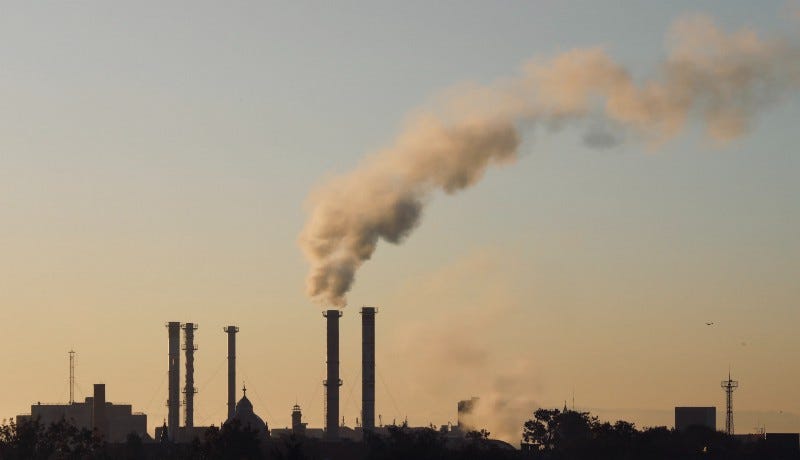Countries ramp up ambition at Biden’s climate summit
E.U., U.K., and U.S. all bring stronger emissions targets to the table.
Welcome to Planet Week, where we highlight the last week of environmental news and what it means for our Planet.
Last week, Typhoon Surigae forced the evacuation of more than 100,000 people in the Philippines. Republicans countered Biden’s infrastructure plan with one (not great) plan of their own. And Exxon proposed a $100 billion carbon-capture plan.
In case you missed it, here’s what else happened around the Planet:

Monday, April 19
State of the Climate: We’re running out of time
The World Meteorological Organization’s new State of the Climate report highlights how climate change continues to wreak havoc for millions of people across the globe.
Despite the temporary dip in activity caused by COVID-19, 2020 saw a “relentless” intensification of the climate crisis. In fact, cuts in food production, transportation, and the economy actually exacerbated the effects of extreme weather on communities. The Guardian has more.
Largest coal union backs clean energy
This was unexpected: On Monday, United Mine Workers of America (UMWA), the United States’ largest coal miners union, publicly supported a clean energy future — so long as coal country is part of the transition.
The move comes as coal mining in America hangs by a thread. According to UMWA’s own plan, coal mining jobs have more than halved in the last decade, as coal plants continue to shutter. Meanwhile, President Joe Biden has prioritized clean energy in his first 100 days in office. Earther has more.
Tuesday, April 20
CO2 surges back
After a pandemic-related drop last year, global CO2 emissions are projected to surge nearly 5% in 2021, according to new data by the International Energy Agency. That would be the second-highest jump in history.
As economies open up, countries are making up for lost time, generating electricity, moving more goods, and feeding the production of raw materials for economic growth, Canary Media writes. And much of that growth is powered by coal, severely impeding climate action, as we wrote about last week in Planet Days.
“This is a dire warning that the economic recovery from the Covid crisis is currently anything but sustainable for our climate,” IEA Executive Director Fatih Birol said in a statement. “Unless governments around the world move rapidly to start cutting emissions, we are likely to face an even worse situation in 2022.”
Wednesday, April 21
Europe’s two new climate goals
Ahead of Biden’s Leaders Climate Summit, two ambitious climate goals came out of Europe:
The European Union legally committed to cutting emissions 55% by 2030, compared to 1990 levels. That’s up from its existing pledge of 40%, though short of the 60% cuts pursued by the EU’s Green bloc, Deutsche Welle reports.
The United Kingdom pledged to cut emissions 78% by 2035, compared to 1990 levels, reports The Independent. That builds on the U.K.’s current commitment of 68% cuts by 2030.
Both goals are to stay in line with the Paris Agreement, which calls for net-zero emissions by 2050 to keep global temperatures “well below” 2 degrees Celsius by 2100.

Thursday, April 22
Countries ramp up ambition at Biden’s climate summit
On Earth Day, the U.S. hosted the Leaders Climate Summit, a two-day virtual forum to promote international coordination on climate action.
At the Summit, which was attended by 40 world leaders, the U.S. unveiled its much-anticipated emissions target, pledging to cut 50–52% of U.S. greenhouse gas emissions by 2030, compared to 2005 levels —that’s roughly double the target set by the Obama administration in 2015, reports The Washington Post.
Below are several other notable announcements from the summit:
Japan aims to cut greenhouse gas emissions by 46% by 2030, compared to 2013 levels — that’s up from its previous goal of 26%.
Canada strives to cut greenhouse gas emissions by 40–45% by 2030, compared to 2005 levels — that’s up from its previous goal of 30%.
South Korea will stop financing coal-fired power plants overseas and intends to announce a more ambitious climate target later this year.
Brazil aims to reach net-zero emissions by 2050, 10 years sooner than its previous commitment. It also double-downed on its earlier commitment to eliminate deforestation by 2030.
China promised to limit, then phase out coal consumption by 2030, though it did not update its previous pledge to hit net zero emissions by 2060.
Also of note: India, Russia, and Australia refused to budge on their short-term climate targets, calling into question the success of the summit.
Now comes the hard part: following through on these pledges. NPR breaks down how the U.S. can deliver on its new pledge through revolutionary transformations in energy, transportation, and industry. And The New York Times lays out the uphill battle to slashing emissions, which will take “sweeping changes to virtually every corner of the nation’s economy.”
In Planet Days this week, we dissect the summit’s goals and how much it actually accomplished.
The U.S. doubles climate finance
Also at the Leaders Climate Summit, the U.S. unveiled its first-ever international climate finance plan, which is intended to help developing nations curb emissions and adapt to a warming world. Specifically, the 13-page plan pledges to double climate finance and triple funding for adaptation by 2024.
The plan still lacks many details and, as E&E News reports, the U.S. is still playing catch-up, with many developed nations already increasing their financial commitments over the last four years.
World could lose fifth of GDP due to climate change
Speaking of finance: Climate change impacts will likely shave 11% to 14% off global economic output by 2050, totaling as much as $23 trillion, according to new research.
Poor nations, who contribute least to the climate crisis, will be hit the hardest. The world’s richest countries could see just a 5% reduction in the size of their economies, compared to 9% in South America, nearly 17% in the Middle East and Africa, and 25% in Southeast Asian Nations countries. Read more in Reuters.
Bonus
And the winner is…
My Octopus Teacher, the story of a man’s unusual friendship with an octopus living in a South African kelp forest, won best documentary feature last night at the Oscars. With or without that win, though, the film is a must-watch.
“There’s nothing academic or stuffy about this dazzling, deep-dive into interspecies communication,” Peter Travers writes for Good Morning America.“You’ll laugh and cry your eyes out at the year’s most unorthodox and unforgettable love story.”
Have a great week,
Brandon and Sam






